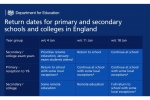Thanks to the Herculean efforts of every single person in education settings, Plan B will be ending in education and childcare settings along with the rest of the country on 27 January 2022.
The Government promised that we would not keep Plan B measures in place for a day longer than was necessary. A promise made and a promise kept. That is why from 27 January, the Government has removed the national guidance on the use of face coverings in communal areas in of education settings - no longer recommended that pupils and students in year 7 and above wear face coverings in classrooms, other teaching areas and communal areas.
The Government has made it clear in our guidance that there are no barriers or restrictions to face-to-face teaching in higher education. The Government expects every university to now be offering the full face-to-face teaching and learning experience to students that they were offering before the pandemic.
The Education Secretary will continue to work collaboratively with the UKHSA and local Directors of Public Health to ensure the right response to local outbreaks. Local directors of public health are able to recommend the use of face coverings in education settings across their area only where the Government and public health experts judge the measure to be proportionate due to specific health concerns. This is a temporary measure and directors of public health continue to advise individual settings experiencing outbreaks
To support schools as the Plan B measures come to an end, the Government has also announced new funding for schools to help ensure our schools remain safe. These measures – enhanced ventilation, vaccines, as well as regular testing – remain crucial to keeping young people in classrooms, learning face-to-face. This new funding from NHS England will make sure all schools are able to fully support the in-school vaccination programme, and a commitment to provide air cleaning units in all classrooms and teaching spaces that need them.
FAQs
Are there any circumstances where I still might need to wear a mask?
Local directors of public health are able to recommend the use of face coverings in communal areas—across their area only—where DfE and public health experts judge the measure to be proportionate due to specific health concerns. This is a temporary measure.
Directors of public health will also continue to advise individual settings experiencing outbreaks. Any local introduction of face coverings will be subject to routine review and removed at the earliest opportunity.
Do pupils, families and staff still have to take regular COVID tests and get vaccinated?
Yes, the Government recommends that all pupils, their families and school, college and early years staff should test twice weekly. This ensures even instances where people have the virus but show no symptoms are picked up and able to isolate to stop the spread of the virus.
It is also important that all those eligible get a vaccine or booster. For information on the importance of getting a vaccine or boosted, please visit our piece here: How getting a booster will help protect education - The Education Hub (blog.gov.uk).
How much is the funding for schools to help ensure they remain safe?
The Government will distribute a total of £8 million in funding from NHS England to support secondary schools with the vitally important in-school vaccination programme for young people – hosting NHS vaccination teams and passing on materials about vaccination.
This comes as over 50% of 12-15-year-olds – over 1.5 million people – have now had at least one dose of the vaccine.
Doe this include funding to help ventilate my child’s classroom?
Yes. The Government is committing to fulfil all eligible applications from 1,288 state-funded education settings for just over 8,000 air cleaning units.
This is in line with the Government’s expectations and initial order of 8,000 units. Up to an additional 1,000 units have now been ordered bringing the total purchase to up to 9,000, allowing all eligible applications to be fulfilled.
This ensures poorly ventilated classrooms or teaching spaces where there are no immediate solutions to otherwise improve ventilation will benefit from a device.
Special schools and Alternative Provision have already received the air cleaning units they applied for, while all other settings with eligible applications will receive them as planned from the start of February.
What else is the new funding going towards?
The funding for schools to continue to support the vaccine programme will provide secondary schools, special schools and alternative provision hosting vaccination teams with a one-off payment of £1,000 with an additional uplift based on pupil numbers.
